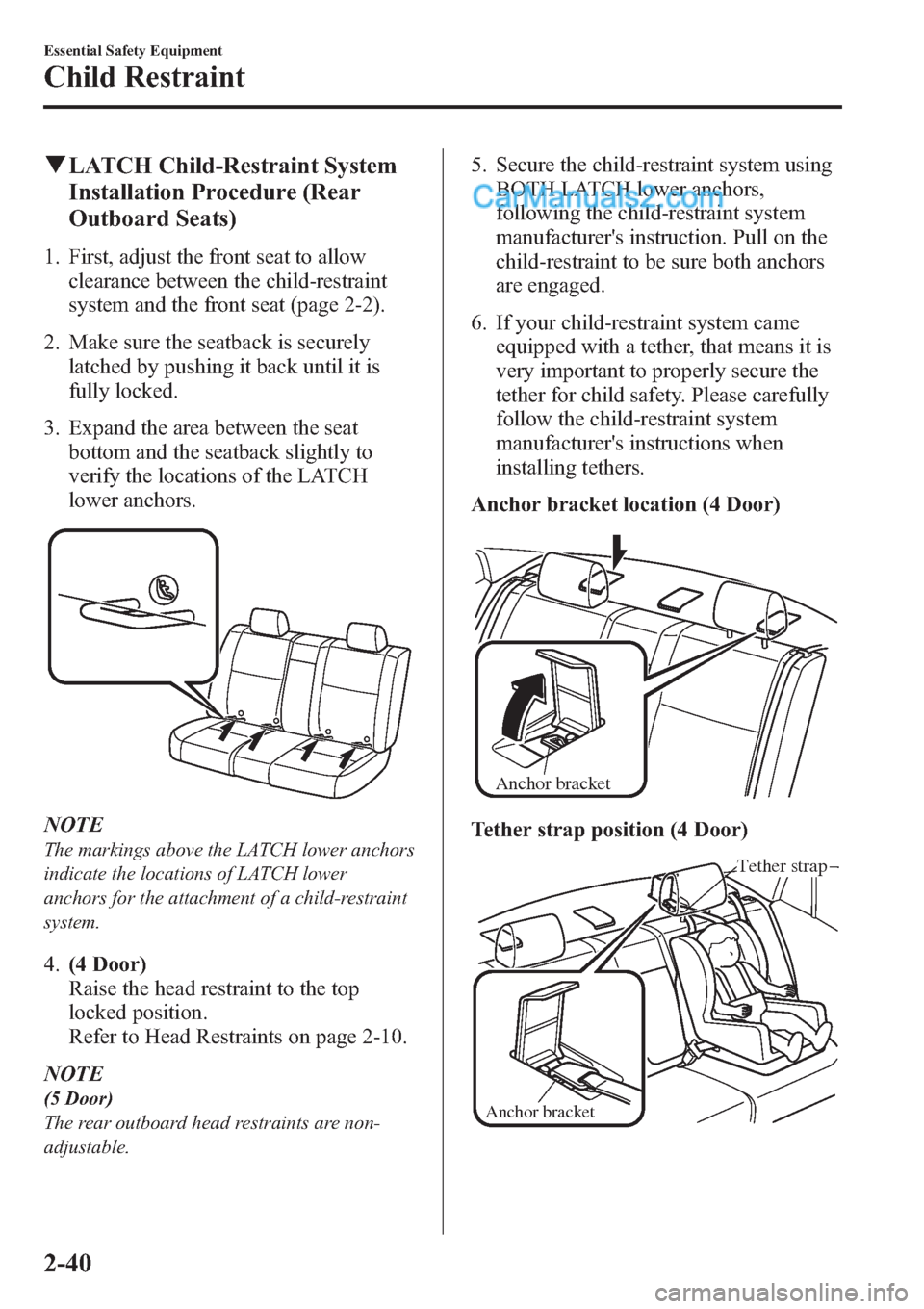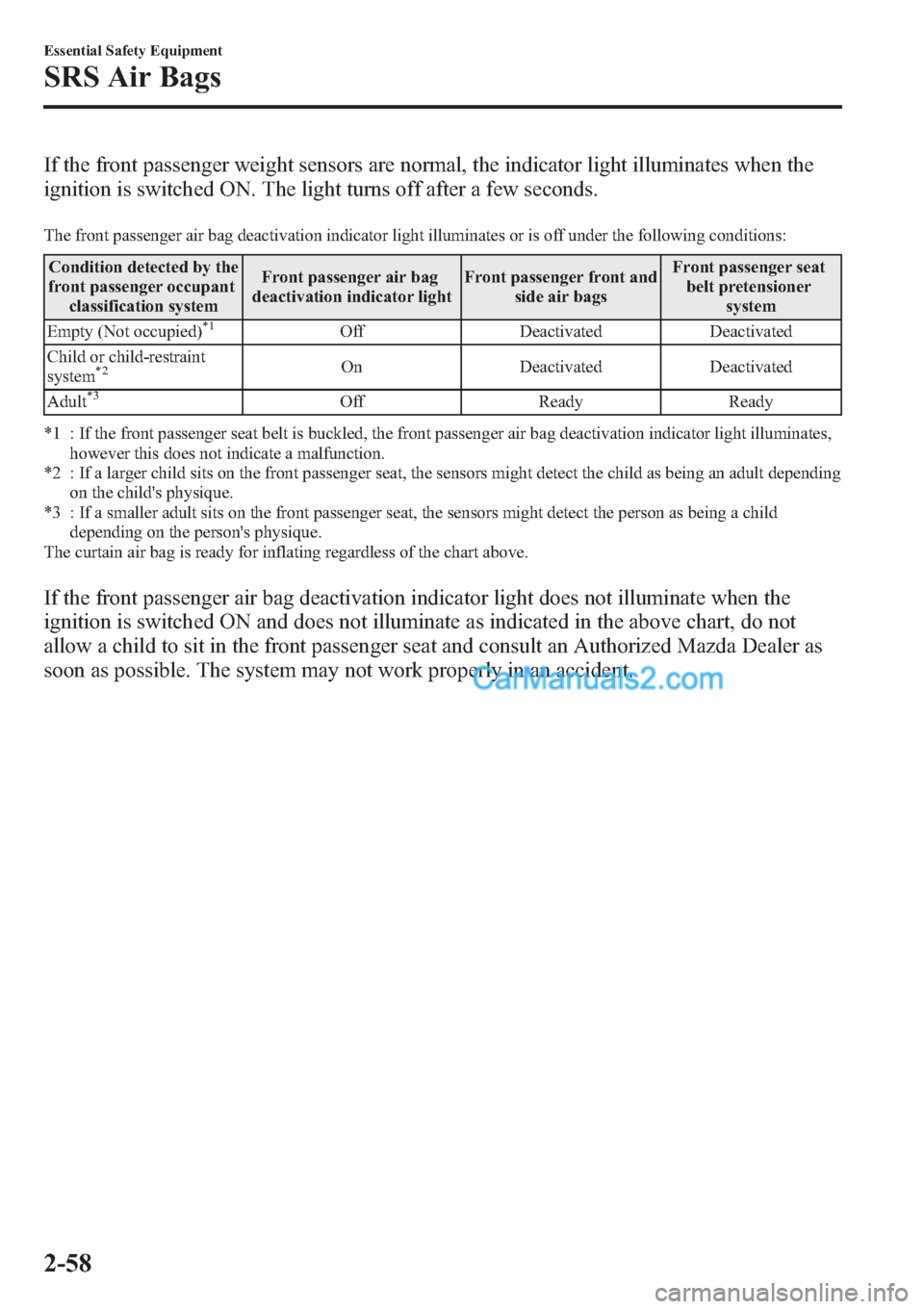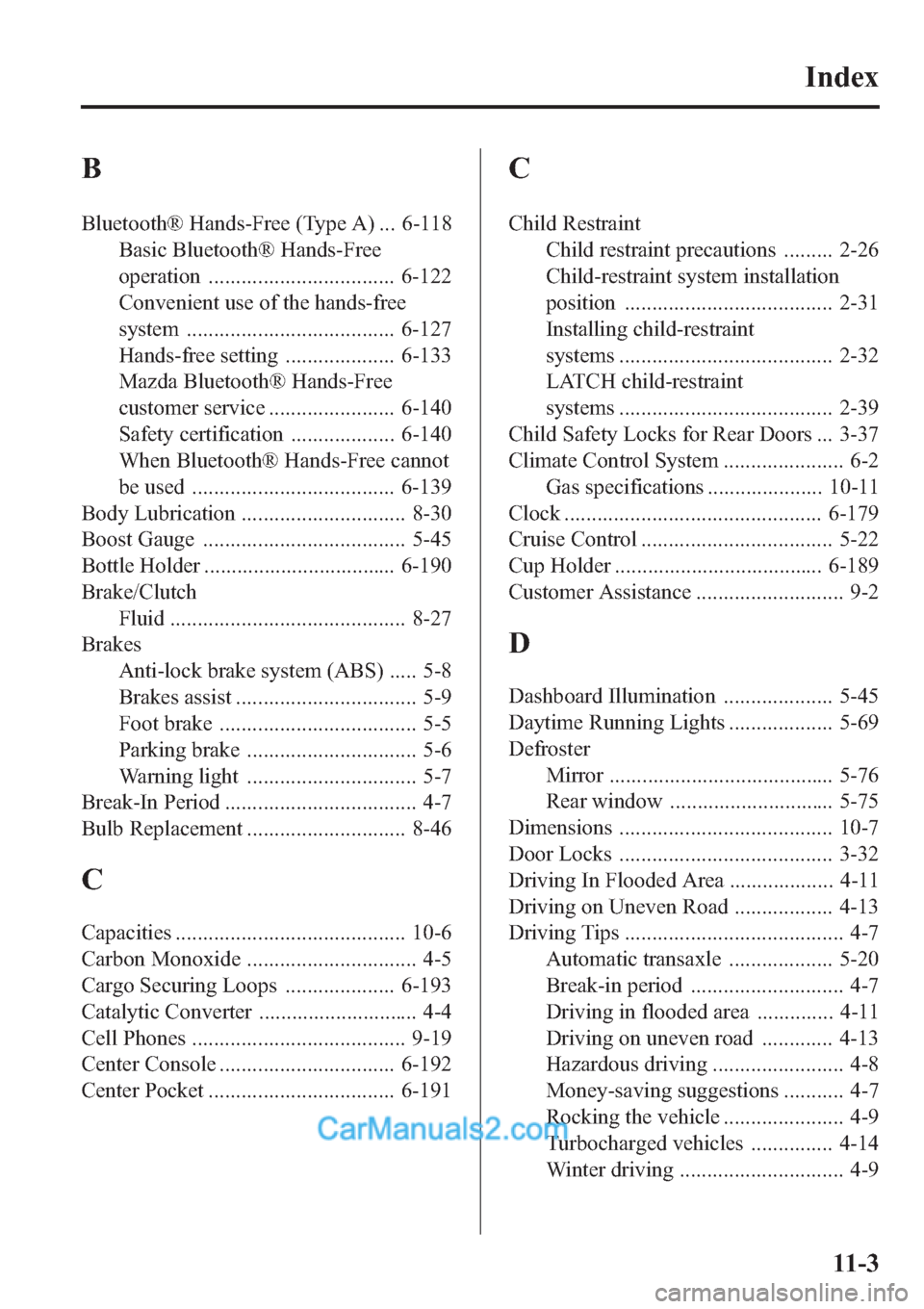child restraint MAZDA MODEL MAZDASPEED 3 2013 (in English) Owner's Manual
[x] Cancel search | Manufacturer: MAZDA, Model Year: 2013, Model line: MODEL MAZDASPEED 3, Model: MAZDA MODEL MAZDASPEED 3 2013Pages: 611, PDF Size: 7.02 MB
Page 55 of 611

qLATCH Child-Restraint System
Installation Procedure (Rear
Outboard Seats)
1. First, adjust the front seat to allow
clearance between the child-restraint
system and the front seat (page 2-2).
2. Make sure the seatback is securely
latched by pushing it back until it is
fully locked.
3. Expand the area between the seat
bottom and the seatback slightly to
verify the locations of the LATCH
lower anchors.
NOTE
The markings above the LATCH lower anchors
indicate the locations of LATCH lower
anchors for the attachment of a child-restraint
system.
4.(4 Door)
Raise the head restraint to the top
locked position.
Refer to Head Restraints on page 2-10.
NOTE
(5 Door)
The rear outboard head restraints are non-
adjustable.
5. Secure the child-restraint system using
BOTH LATCH lower anchors,
following the child-restraint system
manufacturer's instruction. Pull on the
child-restraint to be sure both anchors
are engaged.
6. If your child-restraint system came
equipped with a tether, that means it is
very important to properly secure the
tether for child safety. Please carefully
follow the child-restraint system
manufacturer's instructions when
installing tethers.
Anchor bracket location (4 Door)
Anchor bracket
Tether strap position (4 Door)
Anchor bracket
Tether strap
2-40
Essential Safety Equipment
Child Restraint
Page 56 of 611

Anchor bracket location (5 Door)
Tether strap position (5 Door)
Forward
Tether strap
WARNING
Use the tether and tether anchor only
for a child-restraint system:
Using the tether or tether anchor to
secure anything but a child-restraint
system is dangerous. This could
weaken or damage the tether or
tether anchor and result in injury.
Always route the tether strap between
the head restraint and the seatback:
Routing the tether strap on top of the
head restraint is dangerous. In a
collision the tether strap could slide
off the head restraint and loosen the
child-restraint system. The child-
restraint system could move which
may result in death or injury to the
child.
Always attach the tether strap to the
correct tether anchor position:
Attaching the tether strap to the
incorrect tether anchor position is
dangerous. In a collision, the tether
strap could come off and loosen the
child-restraint system. If the child-
restraint system moves it could result
in death or injury to the child.
Essential Safety Equipment
Child Restraint
2-41
Page 57 of 611

qLATCH Child-Restraint System
Installation Procedure (Rear
Center Seat)
The LATCH lower anchors at the center
of the rear seat are much further apart than
the sets of LATCH lower anchors for
child-restraint system installation at other
seating positions. Child-restraint systems
with rigid LATCH attachments cannot be
installed on the center seating position.
Some LATCH equipped child-restraint
systems can be placed in the center
position and will reach the nearest
LATCH lower anchors which are 400 mm
(15.75 in) apart. LATCH compatible
child-restraint systems (with attachments
on belt webbing) can be used at this
seating position only if the child-restraint
system manufacturer's instructions state
that the child-restraint system can be
installed to LATCH lower anchors that are
400 mm (15.75 in) apart. Do not attach
two child-restraint systems to the same
LATCH lower anchor. If your child-
restraint system has a tether, it must also
be used for your child's optimum safety.
WARNING
Use the tether and tether anchor only
for a child-restraint system:
Using the tether or tether anchor to
secure anything but a child-restraint
system is dangerous. This could
weaken or damage the tether or
tether anchor and result in injury.
Always attach the tether strap to the
correct tether anchor position:
Attaching the tether strap to the
incorrect tether anchor position is
dangerous. In a collision, the tether
strap could come off and loosen the
child-restraint system. If the child-
restraint system moves it could result
in death or injury to the child.
1. Make sure the seatback is securely
latched by pushing it back until it is
fully locked.
2. Expand the area between the seat
bottom and the seatback slightly to
verify the locations of the LATCH
lower anchors.
NOTE
The markings above the LATCH lower anchors
indicate the locations of LATCH lower
anchors for the attachment of a child-restraint
system.
2-42
Essential Safety Equipment
Child Restraint
Page 58 of 611

3. Secure the child-restraint system using
BOTH LATCH lower anchors,
following the child-restraint system
manufacturer's instructions. Pull on the
child-restraint to be sure both anchors
are engaged.
4. If your child-restraint system came
equipped with a tether, that means it is
very important to properly secure the
tether for child safety. Please carefully
follow the child-restraint system
manufacturer's instructions when
installing tethers.
Anchor bracket location (4 Door)
Anchor bracket
Tether strap position (4 Door)
Anchor bracket
Tether strap
Anchor bracket position (5 Door)
Tether strap position (5 Door)
Tether
strap
Essential Safety Equipment
Child Restraint
2-43
Page 60 of 611

Small children must be protected by a child-restraint system as stipulated by law in every
state and province. In certain states and provinces, larger children must use a child-restraint
system (page 2-26).
Carefully consider which child-restraint system is necessary for your child and follow the
installation directions in this Owner's Manual as well as the child-restraint system
manufacturer's instructions.
WARNING
Seat belts must be worn in air bag equipped vehicles:
Depending only on the air bags for protection during an accident is dangerous.
Alone, air bags may not prevent serious injuries. The appropriate air bags can be
expected to inflate only in the first accident, such as frontal, near frontal, side
collisions that are at least moderate. Vehicle occupants should always wear seat
belts.
Children should not ride in the front passenger seat:
Placing a child, 12 years or under, in the front seat is dangerous. The child could be
hit by a deploying air bag and be seriously injured or even killed. Even if the front
passenger air bag deactivation indicator light illuminates, always move the front
passenger seat as far back as possible. A sleeping child is more likely to lean against
the door and be hit by the side air bag in a moderate collision to the front-passenger
side of the vehicle. Whenever possible, always secure a child 12 years and under on
the rear seat with an appropriate child-restraint system for the child's age and size.
Never use a rear-facing child-restraint system in the front seat with an air bag that
could deploy:
Rear-facing child-restraint systems on the front seat are particularly dangerous even
though you may feel assured that a front passenger air bag will not deploy based on
the fact that the front passenger air bag deactivation indicator light illuminates. The
child-restraint system can be hit by a deploying air bag and moved violently
backward resulting in serious injury or death to the child.
Essential Safety Equipment
SRS Air Bags
2-45
Page 63 of 611

Do not modify the supplemental restraint system:
Modifying the components or wiring of the supplemental restraint system is
dangerous. You could accidentally activate it or make it inoperable. Do not make
any modifications to the supplemental restraint system. This includes installing trim,
badges, or anything else over the air bag modules. It also includes installing extra
electrical equipment on or near system components or wiring. An Authorized Mazda
Dealer can provide the special care needed in the removal and installation of front
seats. It is important to protect the air bag wiring and connections to assure that the
bags do not accidentally deploy, the front passenger seat weight sensors are not
damaged and that the seats retain an undamaged air bag connection.
NOTE
lWhen an air bag deploys, a loud inflation noise can be heard and some smoke will be released.
Neither is likely to cause injury, however, the texture of the air bags may cause light skin injuries
on body parts not covered with clothing through friction.
lShould you sell your Mazda, we urge you to tell the new owner of its air bag systems and that
familiarization with all instructions about them, from the Owner's Manual, is important.
lThis highly-visible label is displayed which warns against the use of rear-facing child-restraint
systems on the front passenger seat.
2-48
Essential Safety Equipment
SRS Air Bags
Page 73 of 611

If the front passenger weight sensors are normal, the indicator light illuminates when the
ignition is switched ON. The light turns off after a few seconds.
The front passenger air bag deactivation indicator light illuminates or is off under the following conditions:
Condition detected by the
front passenger occupant
classification systemFront passenger air bag
deactivation indicator lightFront passenger front and
side air bagsFront passenger seat
belt pretensioner
system
Empty (Not occupied)
*1Off Deactivated Deactivated
Child or child-restraint
system
*2On Deactivated Deactivated
Adult
*3Off Ready Ready
*1 : If the front passenger seat belt is buckled, the front passenger air bag deactivation indicator light illuminates,
however this does not indicate a malfunction.
*2 : If a larger child sits on the front passenger seat, the sensors might detect the child as being an adult depending
on the child's physique.
*3 : If a smaller adult sits on the front passenger seat, the sensors might detect the person as being a child
depending on the person's physique.
The curtain air bag is ready for inflating regardless of the chart above.
If the front passenger air bag deactivation indicator light does not illuminate when the
ignition is switched ON and does not illuminate as indicated in the above chart, do not
allow a child to sit in the front passenger seat and consult an Authorized Mazda Dealer as
soon as possible. The system may not work properly in an accident.
2-58
Essential Safety Equipment
SRS Air Bags
Page 75 of 611

Do not increase the total seated weight on the front passenger seat:
When an infant or small child sits on the front passenger seat, increasing the total
seated weight on the front passenger seat is dangerous. The front passenger seat
weight sensors will detect the increased total seated weight, which could result in the
unexpected deployment of the front passenger front and side air bags and seat belt
pretensioner system in an accident and may cause serious injury. Increasing the total
seated weight on the front passenger seat could result in the front passenger front
and side air bags and seat belt pretensioner system deployment in an accident under
the following conditions, for example:
ØLuggage or other items are placed on the seat with the child in the child-restraint
system.
ØA rear passenger or luggage push or pull down on the front passenger seatback.
ØA rear passenger steps on the front passenger seat rails with their feet.
ØLuggage or other items are placed on the seatback or hung on the head restraint.
ØHeavy items are placed in the seatback map pocket.
ØThe seat is washed.
ØLiquids are spilled on the seat.
ØThe front passenger seat is moved backward, pushing into luggage or other items
placed behind it.
ØThe front passenger seatback contacts the rear seat.
ØLuggage or other items are placed between the front passenger seat and driver
seat.
ØAny accessories which might increase the total seated weight on the front
passenger seat are attached to the front passenger seat.
The front passenger front and side air bags and seat belt pretensioner systems will
deactivate if the front passenger air bag deactivation indicator light illuminates.
CAUTION
ØTo assure proper deployment of the front air bag and to prevent damage to the
sensors in the front seat bottoms:
ØDo not place sharp objects on the front seat bottoms or leave heavy luggage on
them.
ØDo not spill any liquids on the front seats or under the front seats.
ØTo allow the sensors to function properly, always perform the following:
ØAdjust the front seats as far back as possible and always sit upright against the
seatbacks with seat belts worn properly.
ØIf you place your child on the front passenger seat, secure the child-restraint
system properly and slide the front passenger seat as far back as possible (page
2-36).
2-60
Essential Safety Equipment
SRS Air Bags
Page 76 of 611

NOTElThe system requires about 10 seconds to alternate between turning the front passenger front and
side air bags and seat belt pretensioner system on or off.
lThe front passenger air bag deactivation indicator light may illuminate repeatedly if luggage or
other items are put on the front passenger seat, or if the temperature of the vehicle's interior
changes suddenly.
lThe front passenger air bag deactivation indicator light may illuminate for 10 seconds if the total
seated weight on the front passenger seat changes.
lThe air bag/front seat belt pretensioner system warning light might illuminate if the front
passenger seat receives a severe impact.
lIf the front passenger air bag deactivation indicator light does not illuminate after installing a
child-restraint system on the front passenger seat, first, re-install your child-restraint system
according to the procedure in this owner's manual. Then, if the front passenger air bag
deactivation indicator light still does not illuminate, install the child-restraint system on the rear
seat and consult an Authorized Mazda Dealer as soon as possible.
lIf the front passenger air bag deactivation indicator light illuminates when an adult is seated in
the front passenger seat, have the passenger re-adjust their posture by sitting with their feet on the
floor, and then re-fastening the seat belt. If the front passenger air bag deactivation indicator light
still illuminates, move the passenger to the rear seat. If sitting in the rear seat is not possible, slide
the front passenger seat as far back as possible. Consult an Authorized Mazda Dealer as soon as
possible.
qDriver and Front Passenger Buckle Switches
The buckle switches on the front seat belts detect whether or not the front seat belts are
securely fastened and further control the deployment of the air bags.
Essential Safety Equipment
SRS Air Bags
2-61
Page 606 of 611

B
Bluetooth® Hands-Free (Type A) ... 6-118
Basic Bluetooth® Hands-Free
operation .................................. 6-122
Convenient use of the hands-free
system ...................................... 6-127
Hands-free setting .................... 6-133
Mazda Bluetooth® Hands-Free
customer service ....................... 6-140
Safety certification ................... 6-140
When Bluetooth® Hands-Free cannot
be used ..................................... 6-139
Body Lubrication .............................. 8-30
Boost Gauge ..................................... 5-45
Bottle Holder ................................... 6-190
Brake/Clutch
Fluid ........................................... 8-27
Brakes
Anti-lock brake system (ABS) ..... 5-8
Brakes assist ................................. 5-9
Foot brake .................................... 5-5
Parking brake ............................... 5-6
Warning light ............................... 5-7
Break-In Period ................................... 4-7
Bulb Replacement ............................. 8-46
C
Capacities .......................................... 10-6
Carbon Monoxide ............................... 4-5
Cargo Securing Loops .................... 6-193
Catalytic Converter ............................. 4-4
Cell Phones ....................................... 9-19
Center Console ................................ 6-192
Center Pocket .................................. 6-191
C
Child Restraint
Child restraint precautions ......... 2-26
Child-restraint system installation
position ...................................... 2-31
Installing child-restraint
systems ....................................... 2-32
LATCH child-restraint
systems ....................................... 2-39
Child Safety Locks for Rear Doors ... 3-37
Climate Control System ...................... 6-2
Gas specifications ..................... 10-11
Clock ............................................... 6-179
Cruise Control ................................... 5-22
Cup Holder ...................................... 6-189
Customer Assistance ........................... 9-2
D
Dashboard Illumination .................... 5-45
Daytime Running Lights ................... 5-69
Defroster
Mirror ......................................... 5-76
Rear window .............................. 5-75
Dimensions ....................................... 10-7
Door Locks ....................................... 3-32
Driving In Flooded Area ................... 4-11
Driving on Uneven Road .................. 4-13
Driving Tips ........................................ 4-7
Automatic transaxle ................... 5-20
Break-in period ............................ 4-7
Driving in flooded area .............. 4-11
Driving on uneven road ............. 4-13
Hazardous driving ........................ 4-8
Money-saving suggestions ........... 4-7
Rocking the vehicle ...................... 4-9
Turbocharged vehicles ............... 4-14
Winter driving .............................. 4-9
Index
11-3